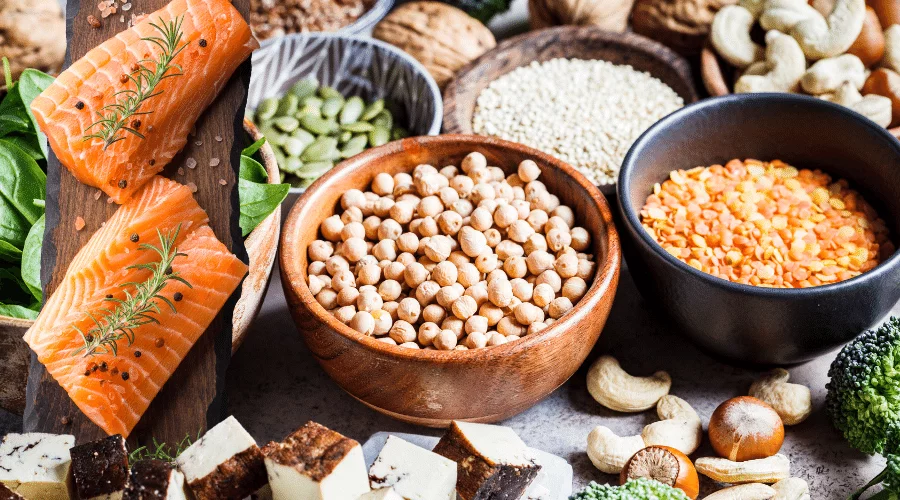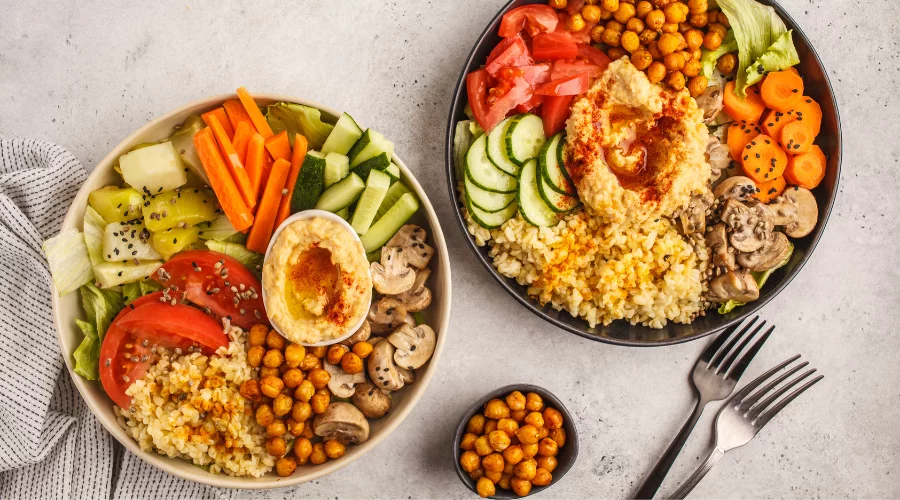Do you feel like you’re always tired and that you need multiple coffees to get you through the day?
Are you sick of not being able to get things done because you don’t have the energy?
Well, the good news is that there’s a solution for that: you need to be eating foods to fight fatigue.
Obviously, your way of eating is not the only reason that can lead you to feel tired, fatigued, or low energy, but it’s what we’re going to focus on today because I feel like a lot of people underestimate its impact.
So here’s how you need to be eating to stop being tired all the time.

Eat full, healthy meals
First, eat healthy balanced meals with whole, minimally processed foods to ensure that you’re getting all the necessary nutrients.
If we look at a few more specifics, it’s very important that you focus on these foods to fight fatigue:
- Whole carbs have multiple sugar molecules with a complex structure and plenty of fiber. This will provide a gradual increase in blood sugar and in energy levels, and won’t cause a quick high and low crash like the more refined carbs. You can eat whole grains such as brown rice, whole-wheat pasta, oatmeal, buckwheat, bulgur, quinoa…And plenty of starchy veggies, like potatoes, sweet potatoes, peas, corn, squash…
- Protein is also essential to help you have energy throughout the day and help you sleep. Protein contains amino acids, and one of them, tryptophan, gets converted into serotonin and then melatonin, which is the hormone that signals your body that it’s time to sleep. Beans and legumes, soy-based foods, fish, and small quantities of white meat are the best options.

- You also need to make sure that you’re hitting all your mineral requirements in order to be as energized as possible, so again, make sure that you’re eating full balanced meals with the foods discussed above. In particular, watch out for these two minerals:
- Magnesium, found in leafy greens, nuts and seeds, chocolate, legumes, and whole grains, promotes sleep quality and duration which can then make you feel more energized [1].
- Iron, found in seafood, red meat, spinach, legumes, and tofu, helps carry oxygen throughout your body and helps your body’s production of energy. Low iron levels are associated with feeling exhausted and energy-deprived.
Also, drinking enough water so that you stay hydrated and to help carry the nutrients to your cells to give them energy is crucial as well. Being dehydrated can cause daytime sleepiness and fatigue.
What about caffeine?
Caffeine is a stimulant and can improve cognitive function, alertness, and vigilance [2]. Adenosine, which is a neurotransmitter in your body, slows down neural activity and makes you feel sleepy.
However, caffeine inhibits these adenosine receptors [3], which will make you more alert. However, you shouldn’t see caffeine as a fix-all because it puts your body under stress with the release of adrenaline + cortisol, and in the long run, it can also disrupt sleep.
It’s recommended not to drink coffee less than 6 hours (at least!) before your bedtime. Also, people who drink coffee every day will build up a tolerance to it [4].
So yes, caffeine can help and it’s ok to have some of course, but you shouldn’t solely rely on it and if you get enough energy from food you shouldn’t have to!
Aside from specific foods to fight fatigue, your way of eating can totally influence your sleepiness or tiredness.
Follow your chronobiology
If you’re eating all of your meals at irregular times, this can really impact your energy levels. Chronobiology, or the examination of the mechanisms linked to time that affect human organisms, is definitely something to think about in nutrition.
There are three components to it: the time of day (what time you eat your meals), the frequency (how many meals will you eat in one day for instance), and the regularity (how often are you eating these meals: is it on a regular pattern or a special occasion?)
Studies [5] have shown that a direct regulatory relationship between food intake and the circadian system is present.
Food and regular meal patterns have synchronizing effects on the circadian system. Vice versa, the primary control level of the circadian system regulates food intake by adapting the human body to the light/dark cycle.
So if you’re not following your chronobiology, this can have an impact on your health, your metabolism, and also your sleep and energy levels.
Now I’m not saying that your meals need to be timed like a robot, but giving yourself a time frame within which to eat your meals can be helpful, as well as making sure that you’re having your 3 meals a day with pretty even spacing between them.
Don’t skip meals
What results from this is that you shouldn’t skip meals, especially not breakfast, which helps your body get out of its nightly fasting state and gets you ready and energized for the day.
This doesn’t necessarily mean that you have to eat a big meal first thing in the morning, but it’s important to eat a little something within an hour of waking up to start your day right.

What you eat for breakfast often defines the rest of your day’s meals as well. If you start with something healthy, balanced, and filling, it’s likely that the rest of your meals are going to look like that as well.
If you skip it and wait until you’re ravenous for lunch, you may make less healthy choices because you won’t have the right amount of energy to do so.
Breakfast isn’t necessary for everyone, but if you skip it and feel like you are tired all the time, it may be worth a try to implement a morning meal.
Listen to your hunger and fullness cues
You should also learn to listen to your hunger and fullness cues. Waiting too long before eating will cause a lack of energy but eating way past your fullness will make you feel drowsy. I suggest learning to use the hunger and fullness scale.
Before eating and after eating, take some time to focus your attention on your stomach.
Can you feel some signs of hunger? Where would you position yourself on a scale from 1 (ravenous) to 10 (overstuffed)?
Ideally, you should start thinking about cooking/getting ready to eat at a 4 so that you can eat before reaching a 1 or 2. If you eat an amount of food that’s suitable for your needs, you should start to reach level 4 around 3-5 hours after a full meal.
If you’re able to find consistency in your meal times and portion sizes, it will be easier to listen to your hunger cues as well.
It’s also crucial to make sure that you are eating enough: fatigue and lack of energy can indicate undereating in general.
Finally, if you feel like your diet is generally healthy and you’re getting sufficient amounts of sleep, but you still feel tired all the time or low on energy, make sure to talk about it to a doctor as it may be the symptom of some underlying condition!

In short
If you’re looking for foods to fight fatigue, you should make sure that your diet is healthy and balanced with plenty of whole carbs, protein, iron, and magnesium, that you’re following your chronobiology, that you aren’t skipping meals, and that you’re listening to your hunger and fullness cues.

